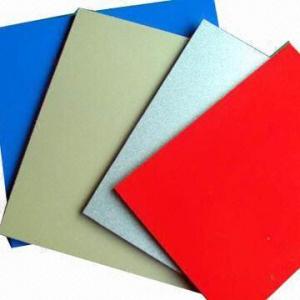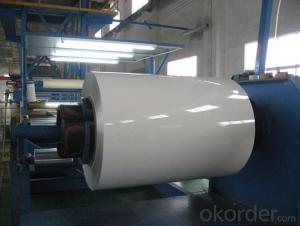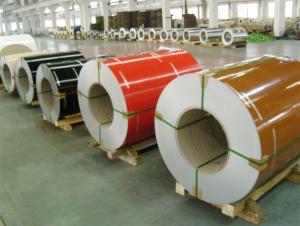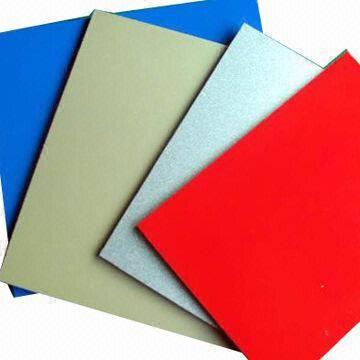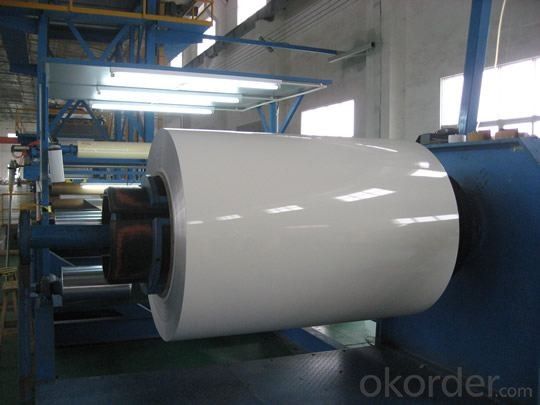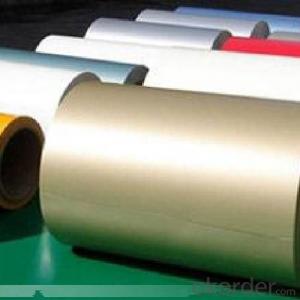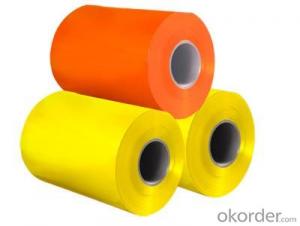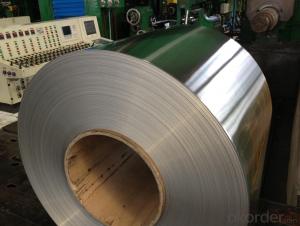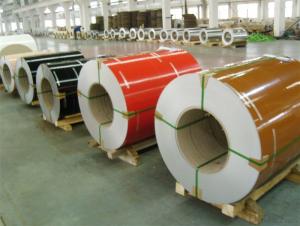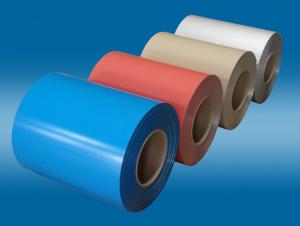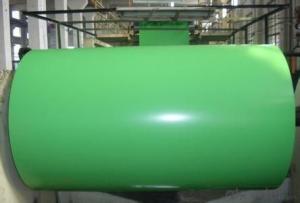Architectural Aluminum Sheets - Prepainted Aluminum Coils/Sheets - Good Price - High Quality
- Loading Port:
- Shanghai
- Payment Terms:
- TT or LC
- Min Order Qty:
- 8 m.t.
- Supply Capability:
- 1000 m.t./month
OKorder Service Pledge
OKorder Financial Service
You Might Also Like
Structure of Prepainted Aluminum Sheet/Coils Description:
Coated aluminum coil/sheet are of a wide range of colors, which gives wonderful appearance no matter in residential and commercial constructions of great exhibition centers.
The coated aluminum coil/sheet have been widely used in the fields of construction and decoration( garage doors, ceiling etc.), electronic appliances, lighting decoration, air-condition air pipes, sandwich panels and drainages etc.
Main Features of Prepainted Aluminum Sheet/Coils:
1) Perfect weather ability, high strength, no special maintenance
2) Convenient construction, short working time
3)Excellent machining heat insulation, sound insulation property and perfect fireproof performance
4) High plasticity, good impact resistance, quakeproof performance and reducing buildings load
5)Goods smoothness, lightweight and rigid, beautiful and cheap
6) Various colors available
7) Simple machining equipments, processing in spot.
Images of Prepainted Aluminum Sheet/Coils:
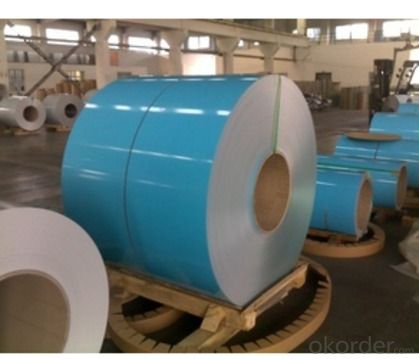
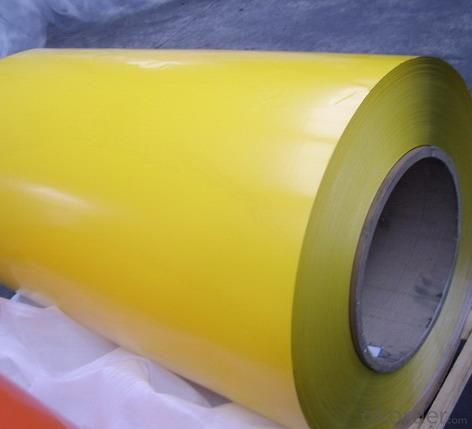
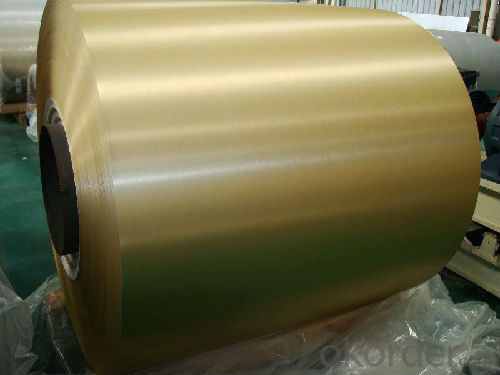
Prepainted Aluminum Sheet/Coils Specification:
NAME | PPGI | GALVANIZED | GALVALUME/ALUZINC |
CERTIFICATE | ISO9001:2008 | ||
STANDARD
| EN10142 JIS G3302 GB/T-12754-2006 | ASTM A653 JIS G3302 SGCC/SGCH GB/T2518 European Standard | ASTM A792 JIS G3321 JIS G3317
|
GRADE
| CGCC CGCH CGCD1-CGCD3 CGC340-CGC570 GRADE
| SS GRADE33-80 SGCC SGCH SGCD1-SGCD3 SGC340-SGC570 SGCC DX51D | GRADE33-80 SGLCC SGLCD SGLCDD SGLC400-SGLC570 SZACC SZACH SZAC340R |
Mode No of prepainted steel coil | 0.16MM-1.5MM*1250MM OR UNDER | (0.12-1.5)*1250MM OR UNDER | 0.16MM-1.5MM*1250MM OR UNDER |
Type of prepainted steel coil
| Steel coil Steel sheets/plates Corrugated steel sheets/plates
| Steel coil Steel sheets/plates Corrugated steel sheets/plates | Steel coil Steel sheets/plates Corrugated steel sheets/plates
|
Technique of prepainted steel coil | Hot rolled-cold rolled -galvalume /galvanized -PPGI/PPGL | Hot rolled-cold rolled - galvanized | Hot rolled-cold rolled -galvalume /Aluzinc
|
Surface treatment of prepainted steel coil | Mini/regular/big/zero spangle, Chromate treatment /chromate-free treatment /untreated unoile/oiled, TENSION LEVELLERT SKIN PASS anti-fingerprint/un-anti-fingerprint, Coating,color | Mini/regular/big/zero spangle, Chromate treatment /chromate-free treatment /untreated unoile/oiled, TENSION LEVELLERT SKIN PASS anti-fingerprint/un-anti-fingerprint, Coating
| |
Application of prepainted steel coil | Structural use ,roofing, commercial use, household appliance, industry, family | ||
SPECIAL APPLICATION | Wear resistant steel, high- strength - steel plate | ||
FAQ of Prepainted Aluminum Sheet/Coils
a.What is monthly capacity
---CNBM is one stated own company and our monthly capacity is about 1000tons.
b. Now which countries do you export your goods?
----Now we export to South East Asia,Africa, North America,South America ect.
Aluminum Coil: An Earth-Friendly Industrial Material
Whether a project calls for aluminum foil (thinner than 0.006 inches in thickness) or aluminum sheet (0.006 inches to 0.070 inches in thickness), aluminum coil is behind the manufacturing process. Aluminum coil is formed by taking one continuous strip of aluminum and coiling it into a roll.
Some of the advantages of aluminum coil is that it is lightweight, heavy duty and able to resist corrosion. By a process called anodizing, whereby the aluminum surface is coated with a protective oxide, that corrosion resistance can be improved even further. As a result, manufacturers who need to increase their productivity and require parts that can withstand the elements rely on aluminum coil to get the job done.
Why might they opt for aluminum coiling over another durable material like steel or copper? At about 33% the density and weight of steel, aluminum renders parts that are much lighter, thereby reducing handling costs and shipping fees. What's more, is the cost is about 50% that of copper.
In fact, according to the Air Conditioning, Heating, Refrigeration News, aluminum versus copper has become "The Great Condensing Coil Debate." In that article published by the industrial news source, while controversy stirs about one versus the other, one thing is clear. Condensing coils made from aluminum have made air conditioning more affordable. "That (aluminum coil) brought the cost of an a/c system down, making it more palatable to consumers and builders."
But the heating, ventilation and air conditioning sector isn't the only industry in which aluminum coil is used. The transportation industry, in fact, is the largest user of the product in the United States, accounting for close to 30% of all that is produced in the nation. Indeed, the average car driven in this country contains over 275 pounds of aluminum, and some luxury car makers use aluminum sheeting to make the entire bodies of their vehicles. Perhaps that's why aluminum has become the most abundantly produced non-iron metal.
In the construction industry, aluminum coil is also being used more and more frequently as trim to cover base materials on homes. Because the aluminum can be anodized with a decorative oxide and comes in a wide variety of colors, it provides a pleasing finishing feature. Best of all, it is easy to install, making it a nice home project for the do it yourselfer. The most typical way in which aluminum coil is put to use in homes is as a trim finish for windows, soffit boarding, siding and roof edging.
Beyond these industrial advantages, aluminum is extremely kind to the environment thanks to its ability to be recycled. That ecological friendliness is further enhanced by aluminum's ability to be recycled an infinite number of times. In the transportation industry alone, that adds up to substantial benefits to the earth. In concrete terms, the average car is made up for about 7% aluminum, yet aluminum amounts to around 40% of the total material scrap value of the average vehicle at the end of its useful life.
- Q: How do you prevent galvanic corrosion when using aluminum sheets with saltwater?
- To prevent galvanic corrosion when using aluminum sheets with saltwater, there are several steps that can be taken: 1. Apply protective coatings: One effective method is to apply a protective coating to the aluminum sheets. This can be done by using specialized marine-grade paints or coatings that are designed to prevent corrosion in saltwater environments. The coating acts as a barrier between the aluminum and the saltwater, reducing the likelihood of galvanic corrosion. 2. Use isolation materials: Another approach is to use isolation materials, such as rubber or plastic gaskets, between the aluminum sheets and any dissimilar metals that may come into contact with them. These materials prevent direct contact between the aluminum and other metals, minimizing the risk of galvanic corrosion. 3. Galvanic corrosion inhibitors: Adding galvanic corrosion inhibitors to the saltwater can help mitigate the risk of corrosion. These inhibitors work by creating a protective layer on the aluminum surface, preventing the electrochemical reactions that lead to galvanic corrosion. 4. Cathodic protection: Employing cathodic protection techniques can also help prevent galvanic corrosion. This involves connecting the aluminum sheets to a sacrificial anode made from a more active metal, such as zinc or magnesium. The sacrificial anode corrodes instead of the aluminum, protecting it from galvanic corrosion. 5. Proper maintenance: Regularly cleaning and maintaining the aluminum sheets is crucial for preventing galvanic corrosion. Saltwater and other contaminants can accumulate on the surface, promoting corrosion. Cleaning the sheets with fresh water and removing any salt deposits can help prolong their lifespan and reduce the risk of galvanic corrosion. It is important to note that these preventive measures should be implemented in conjunction with proper material selection and design considerations. Consulting with corrosion experts or engineers who specialize in marine applications can provide further guidance on the specific requirements and best practices for preventing galvanic corrosion when using aluminum sheets with saltwater.
- Q: need help choosing an aluminum welder at a descent price also
- It all depends on what you are doing. For light duty stuff 1/8 to 1/4 inch a spool gun will be the cheapest option. For intricate work tig. For production a push pull unit with a pulse arc but these are big $.
- Q: Are aluminum sheets suitable for decorative lighting fixtures?
- Yes, aluminum sheets are suitable for decorative lighting fixtures.
- Q: Can aluminum sheets be anodized with custom colors?
- Custom colors can indeed be applied to aluminum sheets through the process of anodizing. Anodizing involves the application of an electrochemical procedure that adds a protective oxide layer to the aluminum's surface, thereby enhancing its durability and resistance to corrosion. In this process, the aluminum sheet is submerged in an electrolytic solution while an electrical current is passed through it. This induces a controlled oxidation of the aluminum's surface, leading to the formation of a porous layer that can be colored with dyes to achieve desired shades and hues. By carefully selecting the appropriate dye, a wide array of custom color options can be achieved. Moreover, anodized aluminum sheets offer versatility as they can undergo additional treatments like laser engraving or printing to create distinctive designs and patterns. Therefore, they are highly suitable for a diverse range of applications in industries such as architecture, automotive, and electronics.
- Q: I would like to use an alloy of copper often called aluminum bronze or aluminum brass for making wire wrapped jewelry but I am unable to find a supplier. An alloy that has no zinc or lead would be best to avoid toxicity problems. This alloy should be principally copper and aluminum but other added materials would be acceptable if not toxic. Nickel, silicon, manganese, and iron are sometimes added to increase performance of the alloy and should be acceptable (no lead or zinc please). The material obviously needs to be bendable enough to work with wire wrapping so if it is brittle it will not work. It should then be at least as usable as aluminum, copper, or stainless steel wire.
- My lady I nonetheless use it to cook dinner my hams and turkeys and to store meals in the frig, however its fitting a dinosaur and its on its last leg and there may be so many different matters now we can use but up to now years it had its use but science and Tech. Has come and made it out of date. However still I like to apply it to ocassions
- Q: Can aluminum sheets be bent or formed?
- Indeed, it is possible to bend or shape aluminum sheets. Aluminum, being a remarkably malleable and ductile metal, can be effortlessly molded or bent without fracturing. This attribute renders it a favored option for a wide range of purposes, including the production of automotive components, aircraft structures, and household products. Diverse techniques, such as press braking, roll bending, and stretch forming, can be employed to bend or shape aluminum sheets. By utilizing these methodologies, the aluminum sheets can be formed into diverse angles or curves to fulfill precise design prerequisites.
- Q: How do aluminum sheets perform in terms of impact resistance?
- Aluminum sheets are known for their exceptional impact resistance capabilities. Due to their high strength-to-weight ratio, aluminum sheets can withstand significant forces without deforming or breaking. This makes them an ideal choice for applications that require protection against impact, such as in the construction, automotive, and aerospace industries. One of the key reasons behind aluminum's impressive impact resistance is its inherent toughness. It can absorb and distribute energy from an impact, enabling it to withstand sudden forces and shocks. Additionally, aluminum's ability to deform elastically allows it to absorb energy by bending and flexing, thus minimizing the impact's effect on the material. Furthermore, aluminum sheets can be further enhanced in terms of impact resistance through various techniques, such as alloying and heat treatment. Alloying aluminum with other elements like copper, manganese, or magnesium can improve its strength and impact resistance by creating a more robust alloy. Heat treatment processes like tempering or annealing can also refine the microstructure of aluminum, enhancing its mechanical properties and impact resistance. In summary, aluminum sheets exhibit excellent impact resistance due to their high strength-to-weight ratio, inherent toughness, and ability to deform elastically. With advancements in alloying and heat treatment techniques, the impact resistance of aluminum sheets can be further improved to meet the specific requirements of various industries.
- Q: iron-based alloys over aluminum in structural members of bridges and buildings?
- Strength-to-weight ratio.
- Q: This question asks for the common types of aluminum sheet windows and doors that are available in the market.
- <p>Common types of aluminum sheet windows and doors in the market include sliding windows, casement windows, fixed windows, and awning windows. For doors, there are sliding doors, swing doors, folding doors, and automatic doors. Each type has specific features and applications, such as sliding windows being space-saving and easy to operate, while casement windows offer better ventilation. Sliding doors are popular for their smooth operation and minimal space requirement, and swing doors are traditional and widely used for their durability and security. These aluminum products are valued for their strength, durability, and low maintenance requirements.</p>
- Q: Are the aluminum sheets suitable for manufacturing audio speaker enclosures?
- Yes, aluminum sheets are suitable for manufacturing audio speaker enclosures. Aluminum is a lightweight and durable material that is often used in speaker enclosure construction. It offers good acoustic properties, reduces vibrations, and provides excellent heat dissipation, making it an ideal choice for speaker manufacturing.
Send your message to us
Architectural Aluminum Sheets - Prepainted Aluminum Coils/Sheets - Good Price - High Quality
- Loading Port:
- Shanghai
- Payment Terms:
- TT or LC
- Min Order Qty:
- 8 m.t.
- Supply Capability:
- 1000 m.t./month
OKorder Service Pledge
OKorder Financial Service
Similar products
Hot products
Hot Searches
Related keywords
